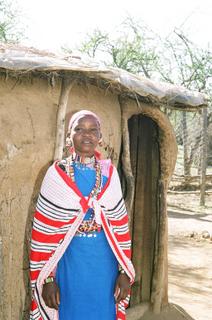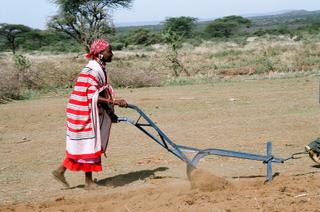I'm wearing my white band, and I just watched Sting sing "Message in a Bottle" at the Live 8 concert in London. I think it's a great campaign and I hope it makes a difference. I hope people get energized to make a difference to even out the power structures in this world and give developing countries a chance.
But there's something that troubles me about all this. Earlier, I saw Bob Geldof introduce the young girl who'd survived the Ethiopian famine 20 years ago, and his statement was "Because WE did this - because WE had a concert 20 years ago, she is alive, healthy, and beautiful". Well, bravo Bob for energizing the world this way. You're inspirational and powerful and determined to make a difference and I admire that. But the trouble is - in some ways, these "you can make a difference" messages get converted into "they can't survive without us" and "we're powerful and rich and we need to lift them out of the gutter" mentality.
No, I'm no expert in international development. But I've been thinking about it alot lately, and I just wonder if somehow we could make sure that, in the middle of our charity and campaigns, we could keep sight of the dignity of the people we're trying to help. They're not just "poor Africans". They're beautiful, hardworking people, and they're trying hard to improve their lives. Yes, we need to support them, but let's make sure we honour them first. And let's keep in mind that charity sometimes translates into power imbalances.
According to Michael Maren in The Road to Hell: The Ravaging Effects of Foreign Aid and International Charity, “The starving African exists as a point in space from which we measure our own wealth, success, and prosperity, a darkness against which we can view our own cultural triumphs. And he serves as a handy object of our charity. He is evidence that we are blessed, and we have an obligation to spread that blessing… Starvation clearly delineates us from them.”
In honour of Live 8, here's a story about my experience in Africa...

Paulina's Story
Her name is Paulina. She was wearing the traditional attire of Maasai women when I met her – layers of colourful fabric tied around her waist and shoulders, a beautiful (and no doubt heavy) variety of beaded necklaces around her neck, more beads wrapped around her drooping earlobe, a brightly coloured headscarf tied around her head… and a broad smile shining from her face.
She stood in front of her mud hut. At first, I approached her tentatively, not sure whether I had any right to impose on her. Her grin broadened as I neared, and she stepped forward eagerly, offering her hand. I started to ask whether I could see her house, but before I could speak, she’d gestured me inside. Others in my group followed.
She led us through the narrow hallway to her bedroom. Inside were 2 small beds where she and her husband slept. Between the beds was a primitive oil lantern on a small table. The only other thing in the room was a shelf over one of the beds where a couple of tin boxes held all of their personal belongings. She gestured for us to sit on the narrow beds made of rough sticks and ropes with thin mattresses covering the frames.
Next to her bedroom was another small bedroom (not a “bedroom” really, just a bed with a blanket hanging in front it). She leaned over the bed to open a flap in the wall to let the light through the small hole in the wall. This was where 2 of her children slept. The third child slept in another bed in the tiny kitchen. In the centre of the floor of the kitchen, not far from the bed, was a small fire pit. On the wall hung 2 or 3 cooking pots.
That was all there was to the house. The entire structure was smaller than my living room. She’d made it herself out of sticks she’d gathered in the forest, coated in cow dung left to dry to a concrete-like consistency in the heat of the sun.
What surprised me (and pleased me, though I didn’t recognize this until later) about this visit to a home so primitive I could not have imagined it before I traveled to Africa was that I didn’t feel pity for Paulina. The broad smile on her face, her eagerness to show us her home, even the way she leaned over her child’s bed to open the flap and let the light shine in – these things showed a woman who didn’t want my pity. She wanted my friendship. She wanted us to find a common sisterhood somewhere beneath the things that made us different. I wanted that too - longed for it.
Now, a few months after I returned from Africa, I can’t get Paulina off my mind. I miss her. I’d like to know her more. I’d like to share stories of motherhood and womanhood. I’d like to find the places where our feet stand on common ground. I’d like to welcome her into my home like she welcomed me into hers.
I don’t want to pity her. Nor do I want to paint a picture of someone who needs our pity. Yes, her life is full of challenges. They haven’t had enough rain to grow a decent crop in a number of years. She has to walk miles to get water. She doesn’t always have enough food to feed her children, or enough money to send them to school. All of these things are true, but pity won’t make her life better. Pity only serves to separate her further from me – it broadens the power gap and worsens the problems associated with global poverty.
Truth is, she could pity me too, for so many reasons. But I don’t want her pity either.
What Paulina and all of her African sisters and brothers (dare I say MY African sisters and brothers) need is not pity. What she needs is friendship. That’s what I need too – what all of my North American brothers and sisters need. If I am her friend, as I hope that I have the right to call myself after such a short visit, than I will remember her and long to find ways to bless her. If I am her friend, than I will allow her to bless me in return.
Pity is a one-way street. Friendship has well-worn paths in both directions. Pity builds power structures and walls. Friendship breaks down the walls and puts up couches and tables. Pity broadens the gap. Friendship builds a bridge.
What I long to do is find a way to build community with my new friends in Africa. I may not see them again. I may never get another chance to visit that beautiful continent. But even if I don’t, I want to serve them somehow. I want to honour their friendship. Within community, people serve each other toward a common good. In the short time we were together, Paulina blessed me greatly by welcoming me into her home and teaching me lessons in friendship, community, and simplicity. Now I want to take those lessons to heart and find a way to share them.
I am blessed with a wonderful community of friends. We share meals, we care for each other’s children, we wrestle with some of life’s tough questions together. Part of being a successful community means reaching beyond the boundaries of your community to welcome those around you – to offer them compassion and understanding. We’re getting pretty good at that. We serve soup and food hampers to those in the neighbourhood who can’t afford to eat. But we don’t just stand at the door and hand it to them – we welcome them in and we sit and eat with them. We honour their humanity. We acknowledge that they are of value to us just as we are of value to them.
This is what I want to share with my African friends. No, we probably won’t eat many meals together, given the vast ocean between us, but perhaps knowing them will impact my life enough that I will make decisions and try to live a lifestyle that doesn’t harm them further. If I can put my greed and consumerism aside and look for ways to level off the power imbalances, than I will have been true to our friendship. Perhaps, along the way, I can convince other people to do the same.



8 comments:
Wow Heather! Beautifully said. If ever I need to explain to someone what I think, but could never say as clearly, about poverty and humanitarian aid, I will show them this blogg. Thank you for writtng it.
Thank you, Heather, for that beautiful post. I wish you'd consider submitting it, photos and all, to a newspaper or magazine. Well done!
Thanks for sharing your experience and your profound thoughts. I think that you are making a difference in the world.
How eloquently you write about your experiences and philosophy!
Such a beautiful expression of a very (to me) complicated situation.
Lots and lots of people should read this.
Thanks for introducing us to a real person. Every time I buy Fair Trade Coffee, I think of farmers like Pauline. I know, in the big picture, I'm not making a huge difference but I'd like to think that people like Pauline appreciate my small efforts.
Thank you for this post Heather. It is a powerful piece of writing. Such wise words on the differences between friendship and pity. I agree with Dale and think this post should be printed far and wide.
A wonderful post and food for thought and though I of course don't know him ( I only met him briefly) I'm sure Geldof would agree with you. These are hardworking, proud people who may need some assistance but do not need or want our pity.
Sadly I doubt we will ever completely eradicate poverty or corruption but let's hope that as the difficulties in Africa become increasingly highlighted, we can afford those in whatever need dignity and respect and that our politicians begin to see what is truly important in world. It is ours, all of ours, it does not belong to Blair, Bush or Schroeder etc. alone.....if Live8 or the Make Poverty History Movement can make even a tiny difference at G8 it is worth it.
Very well put, Heather.
Post a Comment